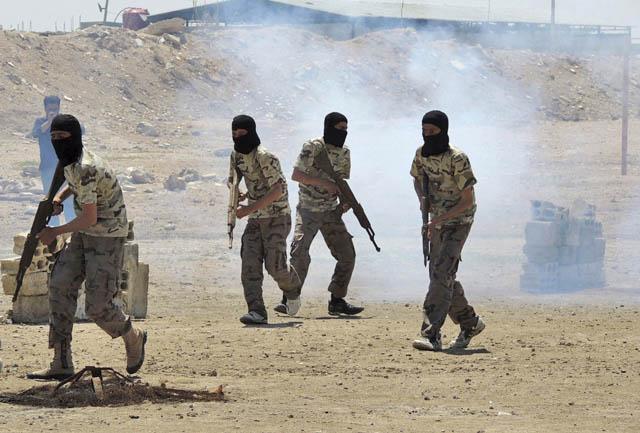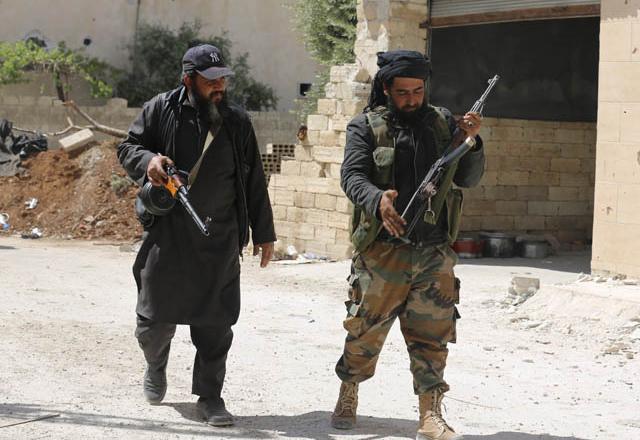You are here
Syria rivalry sharply splits jihadist ranks
By AFP - Apr 19,2014 - Last updated at Apr 19,2014
BAGHDAD — Rivalry between jihadist groups fighting in Syria has sharply divided global militant ranks once loosely allied under Al Qaeda, sparking infighting which experts say has hampered efforts to topple President Bashar Assad.
And while senior leaders of Al Qaeda were all but above question under revered founder Osama Bin Laden, the conflict has gone so far that even his replacement Ayman Zawahiri has come in for fierce criticism on jihadist forums online.
Powerful rebel groups in Syria, including Al Qaeda’s designated local affiliate Al Nusra Front, have been locked in fierce fighting with the Islamic State of Iraq and the Levant (ISIL), with thousands of people killed since January.
Jihadists were initially welcomed by other rebels battling to topple Assad since 2011.
But allegations of brutality towards civilians and rival fighters sparked a backlash and even accusations that they served Assad’s interests.
In a sign of how sharp the divisions have become, ISIL spokesman Abu Mohammed Al Adnani has accused Al Qaeda leaders of betraying the jihadist cause.
“Al Qaeda today is no longer a base of jihad [holy war],” Adnani said in a statement posted on jihadist forums, playing off the militant group’s name, which means “the base” in Arabic.
“Its leadership has become a hammer to break the project of the Islamic State,” Adnani said, adding that “the leaders of Al Qaeda have deviated from the correct path”.
“They have divided the ranks of the mujahedeen [holy warriors] in every place.”
In an interview with Al Qaeda-run media outlet released by the SITE monitoring service Saturday and dated between February and April, Zawahiri called for unity and suggested the Assad regime had penetrated jihadist ranks and sowed sedition.
“If I command you to fight your mujahedeen [holy warrior] brothers, do not obey me. If I command you to blow yourself up among your mujahedeen brothers, do not obey me,” he said.
Online, the clash among jihadists has seen criticism of Zawahiri from around the Islamic world, though others have defended Al Qaeda chief.
“Zawahiri has fallen... We will not listen to him any more. To the dustbin of history, oh Al Qaeda,” tweeted ISIL supporter Munassar Al Mumineen.
Ahmed, another Twitter user, attacked Zawahiri as “old” and called him “the Prince of the Khawarij” — those who have left the proper path of jihad.
Charles Lister, a visiting fellow at the Brookings Doha Centre, said the dispute is ultimately over leadership of the jihadist movement in Syria and internationally.
“This continuing battle for influence between Al Nusra and ISIL has the potential to cause shock waves across the international jihadist community.
“The conflict in Syria has provided an enormous opportunity for jihadist groups, and with such a significant opportunity comes the possibility of divisions,” he added.
Alan Fraser, a Middle East and North Africa specialist with British risk consultancy AKE Group, said disputes among jihadists have happened before, including within Al Qaeda itself.
“Jihadist groups have always been prone to division and infighting, as there is generally a lot more at stake than just ideological issues,” he said.
“There have always been tensions between and within groups over the extent of their extremism and the lengths they will go to seek funding and to impose their beliefs on local populations.”
In the interview, Zawahiri said Al Qaeda remained focused on rallying Muslims for jihad against “America and its Crusader allies and the Zionists and their traitor agents.”
“Our method is to preserve blood and avoid operations that could potentially shed the blood of others unjustly in marketplaces, residential areas, and even among the jihadi groups,” he said, according to SITE.
Inside Syria, splits between jihadist groups ultimately play into Assad’s hands.
“It has played a significant role in dividing the opposition movement, as well as dividing opinion and the degree of support among those who had previously supported the uprising,” Fraser said.
Over the past year, the Syrian army, backed by Lebanese group Hizbollah, has achieved a series of victories, while rebel groups continue to suffer from a lack of supplies, the absence of a unified command structure and infighting.
Lina Khatib, director of the Carnegie Middle East Centre in Beirut, also said inter-jihadist conflict has harmed the rebel cause.
“Divisions have diverted certain groups’ energies away from fighting the Assad regime, as is the case of Al Nusra Front, which today is deeply involved in confrontations” with ISIL, Khatib said.
“The Assad regime is benefiting from infighting among jihadist groups, as they are doing the job for Assad.”
Related Articles
A rogue Iraqi offshoot of Al Qaeda is now killing more rival Al Qaeda fighters every week in Syria than President Bashar Assad’s forces as infighting intensifies among opposition gunmen.
Syrian rebels overran the Aleppo headquarters of the jihadist Islamic State of Iraq and the Levant (ISIL) Wednesday, as claims emerged that ISIL had massacred prisoners there in cold blood.
A leading Jordanian Salafist is currently brokering a ceasefire between rival Al Qaeda branches in Syria in a bid to end infighting that has cost thousands of lives and is dividing the global jihadist movement, Islamist sources say.


















